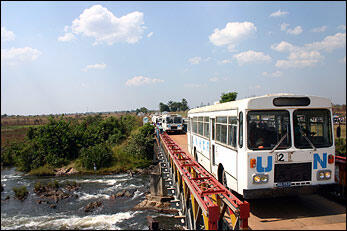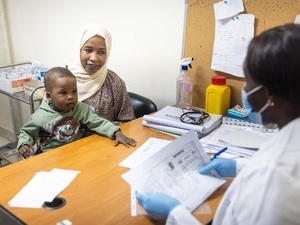Congolese sites close as last Angolan refugees leave
Congolese sites close as last Angolan refugees leave

A refugee family boards the truck at Kisenge to go back to Angola.
DILOLO, Democratic Republic of the Congo, May 30 (UNHCR) - A last convoy of Angolan refugees has returned home from the southern Congolese region of Kisenge, ending a refugee programme that ran for more than 20 years.
Hundreds of people gathered on Friday at Dilolo crossing point on the Congolese-Angolan border to bid farewell to the group of 263 Angolan refugees on their way home from Kisenge in Katanga province. In addition to the passengers, the convoy of 15 UNHCR trucks and buses also carried also a heavy load of personal belongings accumulated over many years in exile. Two separate trucks had to be provided for sheep and goats alone.
"We fled by foot through the bush across the Angolan border in 1984," recalled Maria Kasova, carrying a child strapped on her back with a colourful piece of cloth. More than 20 years later, Kasova queued up patiently to board the repatriation truck. "My husband has already written to me from Angola. He left on an earlier repatriation convoy and is building a new house for us."
As the heavy trucks rumbled across sandy tracks in Katanga's savannah landscape, they left clouds of dust in their wake. They also left mixed feelings among the people who had hosted the refugees and aid agencies for so long.
"This is a symbolic day for us and the refugees," proclaimed the Vice-Governor of Katanga province to the crowd at Dilolo. "The time of suffering from being in exile has come to an end as Angolan refugees regain the freedom of being in their own country. At the same time, their departure, compounded with the departure of UNHCR, will leave a gap in our community."
Mainly farmers by profession, the Angolan refugees have contributed many products to Kisenge's economy. Awada Houssein, UNHCR's head of office in Kisenge, described the impact of the refugees' departure: "One could hardly find tomatoes and potatoes on the market a while after the repatriation operation had begun."
The completion of the UNHCR-organised return to Angola from Kisenge represents the second closure of an Angolan refugee site in the DRC this year, after repatriation from the Ngidinga sites ended in March 2005. In total, some 42,000 Angolan refugees have benefited from UNHCR's voluntary repatriation scheme from the DRC since the programme started in 2003.
Kisenge residents say they will also miss the aid workers and the UNHCR presence that had become an integral part of the community over the years.
"The asylum space has to be preserved and rewarded," said Aida Haile Mariam, UNHCR's Deputy Representative in the DRC. "That's why we leave in good relations with this community, which has so generously hosted Angolan refugees for over 20 years."
The refugee agency is leaving behind six fully-equipped schools with 165 classrooms. It is also handing over other infrastructure, especially in the health sector. Now it is up to the Congolese authorities to use these assets to the best benefit of the local community.
About 600 Angolan refugees chose to stay in the Kisenge area despite UNHCR's advance announcement that assisted repatriation will come to an end. Some may stay forever in the DRC, others are awaiting the completion of their children's schooling cycle before they return on their own. Those "latecomers" who individually arrange their return will still receive a voluntary repatriation form that will guarantee them access to the return package and reintegration programme once they arrive back in Angola.
For those refugees who do not wish to return, UNHCR will provide some help with the integration into Congolese communities.

The convoy crosses from Congolese to Angolan territory through the bridge at Dilolo.
The poor state of roads in war-devastated areas and the danger of landmines are among the obstacles to Angolan repatriation. The recent outbreak of the deadly Marburg virus has also hampered the return to Uíge province in Angola. While UNHCR has suspended returns to Uíge province, the agency has already begun basic rehabilitation works on roads along the major repatriation corridors. Close cooperation with the Angolan government and the UN Mine Action Service is crucial to clear return areas of landmines.
The Angolan voluntary repatriation programme will continue from several other refugee sites hundreds of kilometres north-west of Kisenge - from the provinces of Bandundu and Bas Congo bordering Angola's northern provinces and from Kinshasa. There are currently an estimated 22,000 Angolan refugees in camps and settlements in the DRC, in addition to an estimated 72,000 Angolan refugees in the DRC who have settled spontaneously.
By Jens Hesemann in Dilolo, Democratic Republic of the Congo









